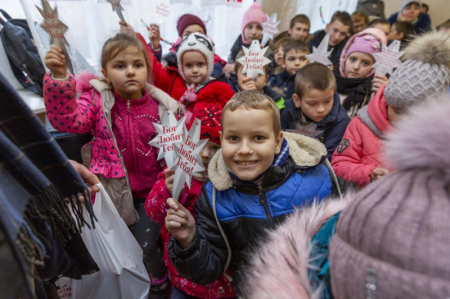US ministry bringing Christmas cheer, Gospel hope to Russia's impoverished children

For children living in impoverished regions across Russia and the former Soviet Union, Christmas is anything but “the most wonderful time of the year.”
The COVID-19 pandemic and the resulting economic collapse forced many state-run orphanages and children’s homes across Russia and neighboring countries to close, leaving thousands of children vulnerable to neglect, exploitation, and domestic violence.
“The need in these areas is greater than ever,” Michael Johnson, president of the Slavic Gospel Association, told The Christian Post. “Not just physical, but spiritual, as well. There are children and teenagers who have no knowledge of God. Christmas is the most significant opportunity for evangelism in these countries.”
To help meet this need, the Illinois-based SGA is partnering with local churches in Russia, Ukraine, Belarus, and the former Soviet countries of Central Asia for Immanuel’s Child, an annual Christmas outreach event bringing hope to underprivileged children and their families.
Launched by SGA in 2002, the Immanuel’s Child initiative last year reached 34,000 children with the hope of the Gospel. This year, in partnership with churches and individuals in the U.S., local Russian-speaking Christians hope to distribute Christmas gifts, children’s Bibles, and personalized ornaments to a staggering 50,000 children.
“Orthodox churches in Russia celebrate Christmas from January 7 until January 11,” Johnson explained. “This gives us a great opportunity to bring unreached families into churches so that they can hear the proclamation of the Gospel. It really is one of the most effective tools because we support an event that's already taking place, but the fruit that we see is absolutely phenomenal.”
Though Immanuel’s Child events are typically held in large venues, local evangelical churches will this year go door-to-door passing out gifts and Bible tracts due to pandemic restrictions on gatherings.
According to Johnson, children are “most excited” by the Star of Bethlehem ornament included in their Christmas packet. Each ornament is printed with ‘God loves you’ in Russian and signed by a supporter in the U.S. who has committed to pray for a child. Signing and sending an Immanuel’s Child paper star of Bethlehem costs $25.
“The star is typically the child's prized possession; they will keep this for many, many years because it means that a family overseas cares enough about them to provide a gift and a Bible and pray for them,” he said.
Vladimir Miskevich, a pastor who has planted 18 churches across Russia and now serves as the chief administrator of the Russian Union of Evangelical Christians-Baptists, told CP that he's personally witnessed the life-changing impact Immanuel's Child has had on numerous families.
“In Russia, giving gifts on Christmas has great significance,” he said. “Through this program, we’re able to meet the needs of individual children, depending on their age. For some children, we can buy local sweets or fruits, but for other children, clothing items, or other necessities, along with a children’s Bible. Immanuel’s Child allows us to meet both physical and spiritual needs.”
According to Miskevich, numerous children, their parents, and in some cases, their grandparents have been baptized as a result of the ministry.
“Entire families attend these Christmas events, packing out local churches,” he said. “Many times, they will return for church services and Sunday School out of simple curiosity.”
Because Christianity is restricted to within the four walls of the church in some areas, many children in Russia “haven't even heard the name of Jesus,” Miskevich said, adding: “The need for the Gospel is great.”
Established in 1934, SGA is connected to 7,000 churches across the 10 countries of the former Soviet Union. The ministry seeks to share the Gospel, help train leaders for the church, and to help the hurting and forgotten in the name of Jesus.
“Through local churches, we do a lot of humanitarian aid, distribution of books, Bibles, and evangelical resources, and church planting activities,” Johnson said.
Now, in addition to Immanuel's Child, the group is behind Christ Over COVID, a new initiative helping to provide food, hygiene items, and medicine to those in need. Though the pandemic struck Moscow particularly hard earlier this year, infections are now rising in Russia's rural areas. As a result, small businesses have been forced to close, hospitals are overwhelmed, and morgues are overflowing in some areas.
“Because of the economic collapse in these countries, the need is greater than ever,”
Miskevich shared. “The economy is very, very fragile. People are hurting. And then, when COVID hit, we were not prepared for it. Everyone suffered. Every sector of society was affected. In some areas, people are afraid to go into the public for fear of getting the virus, and then they have no way to get the food.”
So far, SGA has distributed nearly 3 million meals to families through local churches, along with the Gospel message.
“In many cases, it's only the church that is reaching out and meeting the needs of these people and showing the love of Christ to these people,” Johnson said, adding that SGA gets reports “every day” about people who come to faith as a result of the Christ Over COVID initiative.
“There’s a growing openness and interest in God in the countries across the former Soviet Union,” Johnson contended, citing a recent Pew study that found that since 1991, the share of people who say God is important to them has increased significantly in Russia and Ukraine.
“That’s the setting leading up to Immanuel's Child this year,” he said. “Society is dominated by fear and anxiety. People are hungry for hope. We see this as a huge opportunity to meet the needs of people who are really struggling.”





















